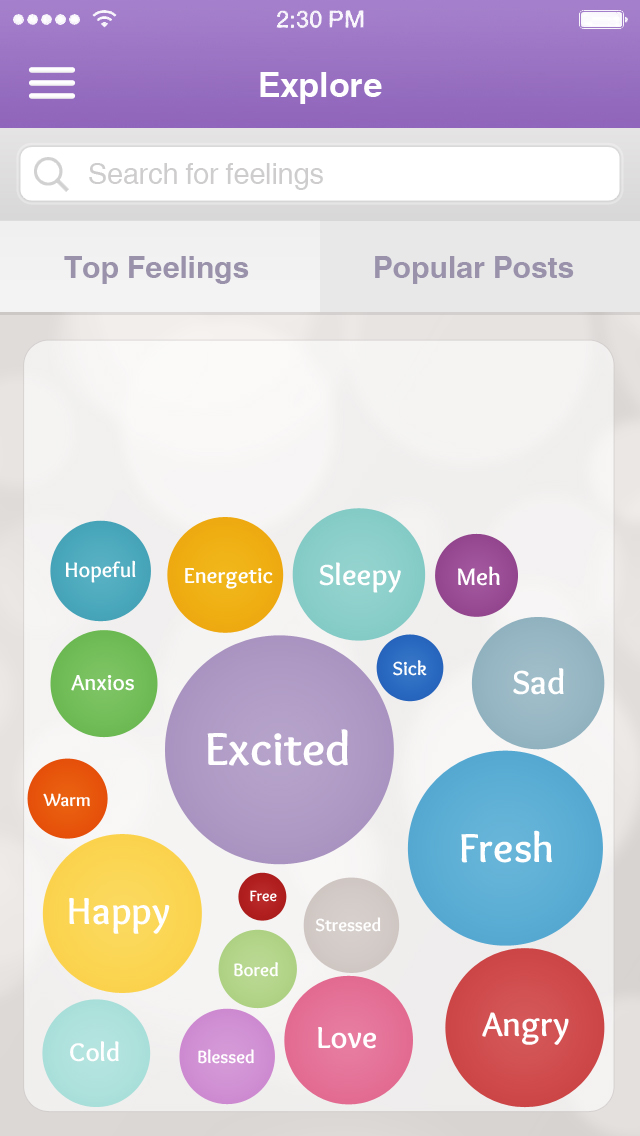Saudi startup Feelit provides teenage girls with a forum to express their feelings


The rise of social networks has shown just how much people like to express themselves. Feelit, as the name implies, is one social network that takes people’s feelings very seriously.
Saudi co-founder Mohammad AlQadi feels strongly about feelings: “they are a global language in a world filled with tech and politics,” he says, “so we want to connect emotions to every day things.”
So he followed his feelings all right, dropping out of college to launch Feelit in September 2013, with co-founders Dima AlOthaimeen, AlBara' Hakami and Omar AlEisa. The iOS app, which recently won the ArabNet Startup Demo in Riyadh, is easy to use. After signing up and choosing a gender, users will have to pick a feeling from the wheel. Whether it’s sad, happy, bored, sleepy, angry, or in love, they then choose to either squash that feeling or embrace it. If they squash ‘bored’ for instance, they’ll get funny videos.
A problem, though, arises from the fact that the content is crowdsourced. I noticed while testing, for instance, that when you choose to embrace boredom you’ll get nonspecific content about boredom that are less engaging than the funny videos delivered if you want to squash boredom. In other examples, you will only get one or few results, or even give you the results for an emotion you haven’t chosen.
Users will also be able to send hugs to someone who’s feeling sad. The team came up with this idea after a Free Hug video went viral on YouTube in Saudi. The guy giving free hugs in the video was arrested later. On Feelit, he jokes, “you can get free hugs without getting in trouble.”
Targeting teenage Saudi girls
The app has attracted around 15,000 active users in the two months after it launched. Back then, Feelit was mainly focusing on young Saudis between 12 and 25 years old, but its most active users turned out to be young girls between 18 and 25. To cater to this category, the company started working on a newer version that will include stickers for girls as well as an Arabic interface. The new version will also eliminate the option of squashing and embracing, replacing that with the option of clicking a trending bubble emotion (shown below), rather than embracing a negative emotion like anger. Each bubble is for one feeling and the more people click on a bubble, the more it grows.

To market the new version, the team will target teenage girls by running offline campaigns in schools and universities, where he will pick five girls (or ‘ambassadors’) from each school and university and train them to market Feelit there. “Then we'll do a competition between schools and universities, with each group doing their own marketing campaign in their school,” he says, “and the school group that gets the most followers on Feelit will be the winner.”
This is all good news for Feelit, but with its new focus, how will the team be able to differentiate between real profiles and fake ones? How can they guarantee an appropriate use of the app or filter their crowdsourced content?
Growing through mentorship
During our first talk three months ago, AlQadi told me that one of their biggest challenges was the lack of mentorship. “We want someone to be passionate about our idea and not just give us their money. We’re new in this and we need mentorship.”
Mentorship they got. After going to Silicon Valley last summer, the co-founders received feedback from experts and investors, who convinced them to rely on in-app purchases by selling faces and stickers to generate revenues. They later met entrepreneur Mustapha Ahmad, their current mentor, who will use his connections in the US to help the startup expand there.

China is on their list too. Expanding in these two markets is a natural step for Feelit, especially given that 76% of iPhone App Store revenue in the US is attributed to in-app purchases in April 2013, according to this study, and at least 90% of iPhone App Store revenue in China and other Asian markets is attributed to in-app purchases.
“Having an office [in China] is a must if you want to be a global company,” he commented. “The Chinese market is hard to penetrate so you need to be there to do it. They have many app stores.”
The startup’s future plans also include reaching 250,000 users by the end of March, and working on a marketing video.
But before expanding to global markets and making future plans, AlQadi needs to reiterate the product and refine it. “[I’ve] been in talks with a couple of investors but we don’t actually need [them] now,” he says. “We want to refine the product and get more users, and once the product is mature, we’ll look for investment. Our value will be bigger then.”
Will Feelit re-shift its focus to a different audience once they set foot in the US and China? Will this local social network succeed in a country like China, which has numerous successful local social networks?
Until all the concerns are cleared away, the co-founders will stick to their plans and make sure their team is always motivated.
“I believe the best thing is to remind every member how we're all building the dream together and everyone needs to do their part in order for the startup to succeed,” he concludes. “When they know their input can make the dream or break it, they'll do their absolute best, and they might work harder than you and inspire you to work even more.”


